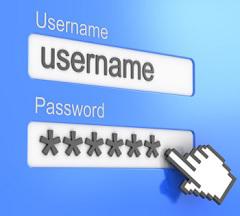Strong Passwords Key to Safe Surfing
Posted by: Timothy Weaver on 01/15/2016 10:02 AM
[
 Comments
]
Comments
]
We have discussed strong passwords before. It is still essential to a safe surfing experience.
 Passwords are the digital keys to our networks of friends, our colleagues, and even our banking and payment services. We want to keep our passwords private to protect our personal lives, and that includes our financial information. The two most important passwords are those for your email and social network accounts.
Passwords are the digital keys to our networks of friends, our colleagues, and even our banking and payment services. We want to keep our passwords private to protect our personal lives, and that includes our financial information. The two most important passwords are those for your email and social network accounts.
If criminals can gain access to your email account, they can spam your friends with links to malicious sites. Same with social network accounts. Additionally, if someone gains access to your email account, they could use the "forgot your password?" link on other websites you use, like online shopping or banking sites. One method is by attempting to log on to your account and guessing your password based off of personal information gained from your security questions.
Where possible, use two factor authentication. When using 2FA, you can choose two of three types of identification to provide:
A password or pin number.
A tangible item such as the last 4 digits of a credit card in your possession or a mobile device that a code can be sent to.
A part of you such as a fingerprint or voice print.
Don't use a derivative of your name, the name of a family member or the name of a pet. In addition to names, do not use phone numbers, addresses, birthdays or Social Security numbers.
Don't answer "yes" when prompted to save your password to a particular computer's browser.
Do use a combination of uppercase and lowercase letters, symbols and numbers.
Source: Asianage
 Passwords are the digital keys to our networks of friends, our colleagues, and even our banking and payment services. We want to keep our passwords private to protect our personal lives, and that includes our financial information. The two most important passwords are those for your email and social network accounts.
Passwords are the digital keys to our networks of friends, our colleagues, and even our banking and payment services. We want to keep our passwords private to protect our personal lives, and that includes our financial information. The two most important passwords are those for your email and social network accounts.If criminals can gain access to your email account, they can spam your friends with links to malicious sites. Same with social network accounts. Additionally, if someone gains access to your email account, they could use the "forgot your password?" link on other websites you use, like online shopping or banking sites. One method is by attempting to log on to your account and guessing your password based off of personal information gained from your security questions.
Where possible, use two factor authentication. When using 2FA, you can choose two of three types of identification to provide:
A password or pin number.
A tangible item such as the last 4 digits of a credit card in your possession or a mobile device that a code can be sent to.
A part of you such as a fingerprint or voice print.
Don't use a derivative of your name, the name of a family member or the name of a pet. In addition to names, do not use phone numbers, addresses, birthdays or Social Security numbers.
Don't answer "yes" when prompted to save your password to a particular computer's browser.
Do use a combination of uppercase and lowercase letters, symbols and numbers.
Source: Asianage
Comments





